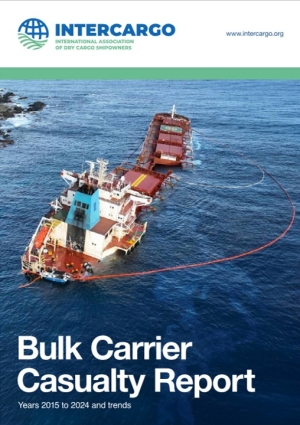


(Posted on 15/06/25)
INTERCARGO, the International Association of Dry Cargo Shipowners, reports encouraging progress in bulk carrier safety, with vessel losses and fatalities continuing to decline over the last decade. However, serious security threats in 2024 demand urgent international action to protect seafarers and uphold freedom of navigation.
The Bulk Carrier Casualty Report 2025 identifies the loss of 20 bulk carriers (≥10,000 dwt) between 2015 and 2024, resulting in 89 seafarer fatalities. Groundings remain the leading cause of vessel losses, responsible for 45% of cases, while cargo liquefaction continues to pose the greatest threat to life, accounting for 55 deaths, which is more than 60% of the total. Cargo shifting (distinct from liquefaction) caused the loss of two ships and 12 lives, highlighting an additional area of concern.
Although only one operational casualty was recorded in 2024, the year was marked by three separate attacks on bulk carriers in the Red Sea – Rubymar, True Confidence and Tutor – involving missiles, drones and uncrewed surface vessels. These incidents, which resulted in four seafarer deaths, are documented separately from the statistical analysis but underscore a dangerous deterioration in maritime security.
John Xylas, Chairman of INTERCARGO, commented: “The dry bulk sector should take pride in the improved safety performance reflected in this year’s report. But the unacceptable attacks on merchant ships in 2024 have reminded us that safety today extends beyond seamanship and regulatory compliance; it is fundamentally about protecting human life. Seafarers must never be placed in harm’s way for simply doing their jobs.”
The report also shows that bulk carrier losses now average just two per year, with a notable decline in average fatalities per casualty over successive 10-year periods. These gains are attributed to improved ship design, better crew training, and stronger regulatory frameworks. Nevertheless, INTERCARGO emphasises that significant risks persist, particularly those related to improperly declared cargoes, navigational failures and delays in the submission of accident investigation reports by flag States. The average reporting time to the IMO GISIS platform remains over two years, severely hindering the industry’s ability to learn and implement timely corrective actions.
With more than 12,500 bulk carriers in service globally and demand for dry cargo trade continuing to grow, INTERCARGO reiterates its call for a collective industry commitment to achieving zero loss of life and zero loss of ships. The Association will continue to work with its members, international bodies and wider stakeholders to advance this goal, while also advocating for immediate measures to ensure the security of seafarers in high-risk regions.
AtoB@C Shipping, a subsidiary of ESL Shipping, has announced the successful delivery of Fleximar, the... Read more
Western Bulk, together with reputable Norwegian partners A/S J. Ludwig Mowinckels Rederi, Premium Maritime... Read more
Pacific Basin Shipping Limited, one of the world’s leading dry bulk shipping companies, has announced... Read more
Columbia Group anticipates a period of strong expansion as an increasing number of international shipowners... Read more
Norse?Ship Management has expanded its use of Smart Ship Hub’s high frequency sensor data and... Read more
As the maritime industry gears up to welcome the IMO’s STCW bullying and harassment training amendments... Read more
NORDEN has acquired the cargo activities of Taylor Maritime in Southern Africa (previously operated... Read more
Philippos Ioulianou, Managing Director of EmissionLink, has warned the IMO’s decision to delay... Read more
VIKAND has highlighted the need for cultural change in the maritime sector as reports of bullying, harassment... Read more
The maritime industry is experiencing a period of significant transformation, driven by rapidly evolving... Read more